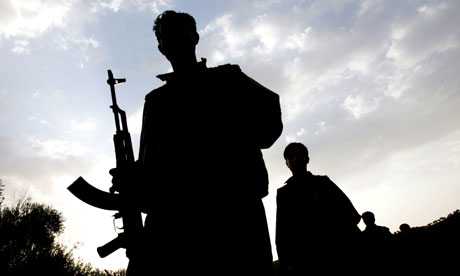A welcome spotlight shone on Turkey’s Kurdish war
Maya Jaggi
guardian.co.uk, Friday 16 December 2011 22.55 GMT

Kurdistan Workers Party members silhouetted on a hillside in southeast Turkey
Kurdish insurgents belonging to the PKK. Photograph: Mustafa Ozer/AFP/Getty Images
Snow, the 2002 novel by Turkey’s Nobel literature laureate Orhan Pamuk, was set in north-eastern Anatolia in the 1990s, as war with secessionist Kurds raged in the wings. Oya Baydar’s fine novel – her seventh, and the first to appear in English – brings that conflict to the fore. Published in Turkish in 2007, it is set in the recent past, as a war fought with Kurdish separatists since 1984 intensifies in the mountains and spills across borders, while tourists are targeted by seaside bombings.
The protagonists are an Istanbul couple in their 50s: Ömer Eren, a celebrity writer who drinks as his inspiration dries up, and his wife Elif, a genetics professor whose ambition has stilled her unease at experimenting on small mammals. When Ömer, waiting for a bus home from Ankara, sees a pregnant Kurdish woman wounded by a stray bullet, he decides to visit her and her husband’s relatives in the south-east. His own wife’s journey west, to a conference in Copenhagen, heightens their sense of estrangement.
A source of grief is their “lost” son Deniz, born while his father was in jail for writing in a leftwing magazine during the 1980 military coup. Ömer and Elif met as teenagers building a bridge (with obvious symbolism) in the Kurdish region. But their son failed to match up to their ideals. After his Norwegian wife was killed in a terrorist bombing near the Blue Mosque – not by separatists, but a far-left group – Deniz retired with his young son to a tiny Norwegian island. As Ömer revisits the Kurdish east, his wife visits the son she scorns for living the “happiness of swine” among “Nordic peasants”.
After a bus journey punctuated by road blocks, Ömer enters a scorched landscape, where a banner proclaims, “one country, one flag, one language”, but a bust of Ataturk, founder of the republic, is swathed in barbed wire. A boy tells him that this is “my land and your colony”, while a hotelier warns of the special team in black snow masks: “If they take you in, they will question you like there’s no law or constitution – or even God.”
Children who have Turkish beaten into them grow ashamed of their mothers’ tongue, then of their shame. Many join the mountain rebels, finding that “the sword is more powerful than the pen”. As the widowed Jiyan, with whom Ömer has an affair, tells him, “One cannot become an artist here … one becomes a guerrilla, a terrorist, a traitor, a separatist, a collaborator, a martyr or an informer. Or you are captured dead.” Kurds are caught between army and guerrillas, often conscripted to kill brethren. Her husband’s resolute non-violence made him a target for all sides.
In a compelling, polyphonic structure, the alternating journeys of Ömer and Elif are interspersed with the story of the Kurdish couple, Zelal and Mahmut. Zelal’s pregnancy followed rape – whether by soldiers or rebels – and she is fleeing the logic of “honour” that would see her killed by her brother. Mahmut is a deserting guerrilla whose wounds she nursed, in a novel filled with fugitives seeking sanctuary from violence. He is pressured to take one last job for terrorists who threaten Zelal, since, for the rebels: “Entrance is free, but the exit costs.”
Baydar (who spent 12 years in exile after the 1980 coup, and is an advocate of Kurdish rights and peace) has little time for intellectuals’ complacency. Ömer has spoken out for Kurds on TV, but lapses into peevish “white Turkish” condescension: “All that trouble he faced to protect their rights, being denounced as a traitor, tried under this or that article … none of it is appreciated. They neither trust nor thank you.” Turkey’s east of “harsh accents”, spicy food and bootleg raki is, the novel suggests, as exotic to most Turks as any orient. For Elif, Turks are “Aegean, Mediterranean people”, who “feel closer to Europe”. Yet Turkish prejudices against Kurds are shown up by Scandinavian skinheads’ feelings about Turks. There are other shifts, as Elif comes to see the expectations imposed on her son as a form of violence, and Mahmut’s father rebukes Ömer: “Our children are not our mirrors that they should reflect our values … You haven’t lost your son unless he is actually dead.”
Although Baydar’s compulsion to flag her characters’ shortcomings signals their development too early, the changes of heart are subtly drawn. The translation improves after an unfortunate opening that makes heavy going of Ömer’s writer’s block. That this welcome arrival in English of an important Turkish novelist coincides with a major resurgence in the Kurdish war makes it even more timely.
via The Lost Word by Oya Baydar – review | Books | The Guardian.

Leave a Reply